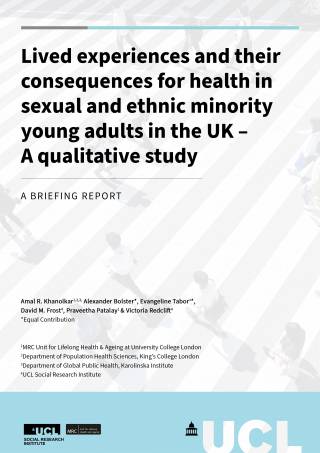Researchers from the MRC LHA and the Social Research Institute at UCL have released a new report on lived experiences and their consequences for health in young adults of sexual and ethnic minorities

The preliminary findings are summarized in this briefing report. Participants’ experiences at the intersection of minority identities were very diverse and they described several challenges, barriers & behavioral changes that impacted their health and wellbeing, and their integration in both ethnic minority and sexual minority communities. Dominant findings include participants experiencing high levels of mental ill-health, a severe lack of appropriate mental health support, and significant discrimination from within the sexual minority community including stereotyping and racism. Participants described physical rejection from LGBTQ+ spaces as well as a more general lack of representation in the LGBTQ+ community, and the need for ethnic minority specific queer spaces.
Despite the significant negative experiences and challenges faced by participants, some also highlighted key 'protective factors’ such as 'Queer Joy', and pride in identifying as ethnic and sexual minority, and the value of 'microcommunities' where they didn't have to explain themselves.
Some policy implications include improving accessibility to formalized mental health support including greater representation of ethnic minority and sexual minority therapists and stronger government policies to efficiently tackle sexual, ethnic, gender and faith-based discrimination in physical and virtual spaces. There is an urgent need to educate both the wider LGBTQ+ and heterosexual communities of the potentially adverse impacts discrimination may have on individuals identifying with multiple minority identities and improve access to ethnic minority specific LGBTQ+ virtual and physical spaces.
This study is a collaborative project between the MRC Unit of Lifelong Health and Ageing at UCL and the Social Research Institute at UCL (Co-PIs Dr Amal R. Khanolkar & Dr Victoria Redclift).
To read the report:
 Close
Close

